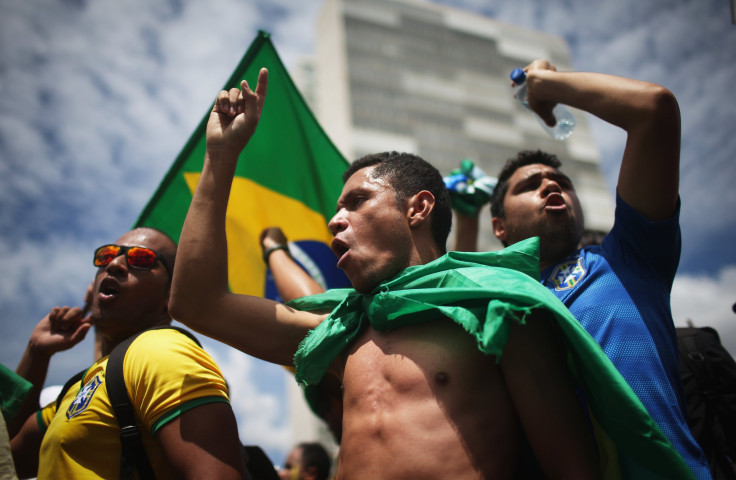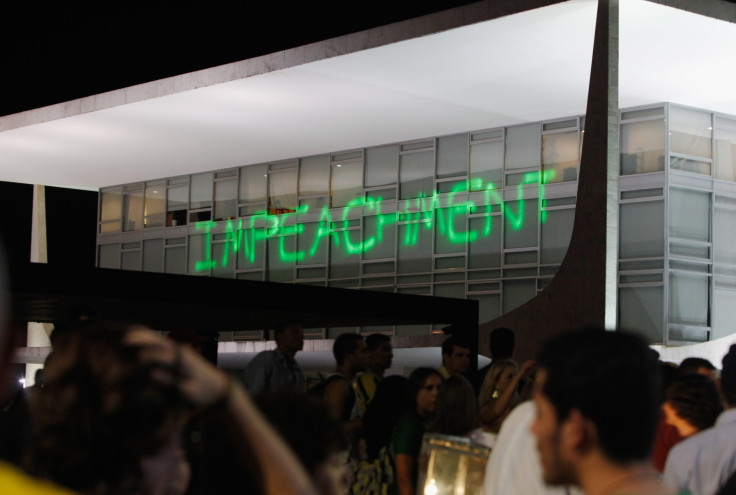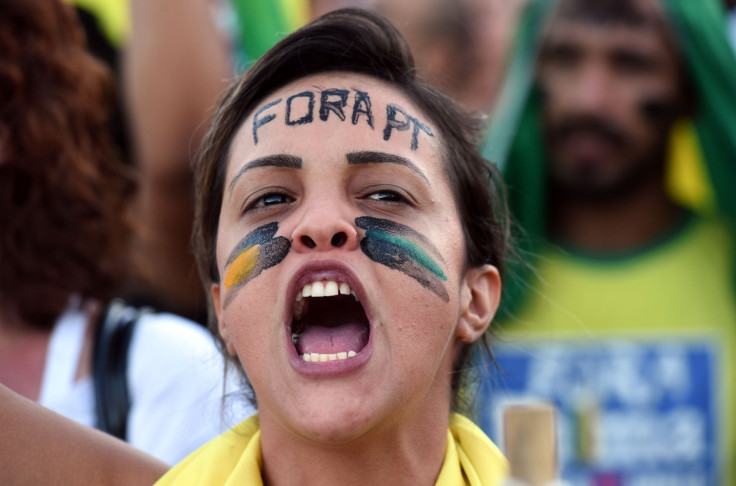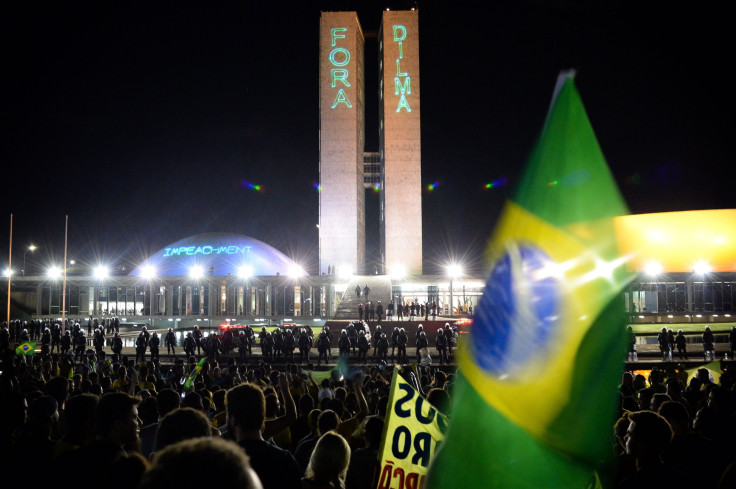Why Are Brazilians Protesting Against Dilma Rousseff? Anti-Government Demonstrations Dominated By Educated Youth

Thamiris Batista da Silva stood on the curb of Avenida Brasil in Belo Horizonte with hundreds of other young protesters as average Brazilians commuting to work whizzed past in cars and buses. They waited for the traffic lights to turn from green to yellow to red. Then they flooded the highway with their placards and banners, chanting “basta,” or “enough.”
“It was just young people,” said Batista, 19, who studies international relations at the nearby Ibmec private university in Rio de Janeiro, recalling the recent Thursday morning protest. “They didn’t want to stop the traffic. They just wanted to show their frustration."
As Latin America’s largest economy faces its worst-ever recession, nationwide protests have swept Brazil in recent weeks to demand the impeachment of President Dilma Rousseff amid a corruption scandal that has implicated politicians in the ruling Workers Party. The demonstrations are overwhelmingly dominated by people who are younger, wealthier and better educated than the average Brazilian and who are frustrated over the stalled economy that has made it difficult for them to find work.
“They are young, white, educated elite,” said Alec Lee, Brazil analyst at Frontier Strategy Group, a global research and advisory firm in Washington that specializes in doing business in emerging markets.
With President Luiz Inacio Lula da Silva at the helm, Brazil had a decade of economic boom and social progress starting in 2003, in which more than 26 million people were lifted out of poverty, and inequality was greatly reduced. However, GDP growth hit the brakes from 4.5 percent 2006-10 to 2.1 percent 2011-14 and down to 0.1 percent in 2014, according to the World Bank. The founding member of the ruling party, known simply as Lula, now faces money-laundering charges related to a multibillion-dollar corruption scandal involving the state-run oil company Petrobras.
“The government has lost credibility, investor confidence has collapsed, investment has fallen and, finally, that’s arriving in the real economy where you’re seeing job losses accelerate,” Lee said. “It’s not just an economic crisis but really a political crisis.”

The sprawling investigation has also ensnared Latin America’s largest construction conglomerate, Odebrecht, which allegedly paid more than $2 billion in bribes to obtain contracts with Petrobras for projects that later skyrocketed in cost. The company said in an online statement Tuesday its former CEO Marcelo Odebrecht, who was sentenced to 19 years in prison this month, will participate in a leniency accord that could expand Brazil’s largest-ever corruption case.
Rousseff led the Petrobras board for several years while the alleged kickback scheme played out. When Lula left office with record-high popularity levels, Rousseff was his handpicked successor, and she easily won the 2011 presidential election. She is now accused of mismanagement of state funds. Prosecutors for the corruption case allege Rousseff hid the size of Brazil’s budget deficit and manipulated the government’s accounts to boost the amount of money she could spend while running for re-election in 2014, according to the Associated Press.
Brazilian lawmakers voted to commence impeachment proceedings against the embattled president this month. A trial could last six months, and she will be relieved of office during that time. There are also separate allegations that Rousseff illegally financed her re-election campaign with funds from Petrobras. Brazil’s top electoral court, TSE, may decide to annul her election, in which case new general elections must be scheduled in 90 days.
“Try to explain that to whatever person you might find on the street,” Lee said. “The issue is actually pretty complex.”
That’s largely why Brazil’s educated elite are leading the massive anti-government protests. The wealthier also have better access to the internet and social media where many of these social movements began.
“We young people have the impression that we can change the world — not just change but change for the better,” said Mauro Victor Castro, 22, an engineering student at Pontifical Catholic University of Goiás in Goiânia in central-west Brazil.
Brazil’s youth also are struggling to find opportunities in one of the bleakest job markets in modern history, analysts said. Mercado Popular, a blog of Brazilian economists, estimates that youth unemployment currently sits at 27 percent, based on official data coming from the statistical agency IBGE. Youth unemployment was around 15 percent in 2011, Lula’s last year in office, according to the CIA World Factbook.
“It’s a mess; it’s an unbelievable mess. It’s impossible for the government to function in that way,” said Ernesto Talvi, director of the Brookings Global-CERES Economic and Social Policy in Latin America Initiative in Washington. “Brazil doesn’t have a fundamental economic problem. It has as a credibility problem that can be solved relatively quickly if you have a government able and willing to do the right thing and the international community able and willing to support Brazil.”

A recent survey by the Datafolha polling institute in São Paulo conducted 2,794 interviews in 171 municipalities, asking pollsters what they thought about Rouseff’s administration. The rejection levels were highest among youth, people with higher education and wealthier households. Seventy-one percent of both 16- to 24-year-olds and 25- to 34-year-olds surveyed by Datafolha said they thought Rousseff’s administration was “bad” or “very bad.” Meanwhile, 64 percent of pollsters 60 and up replied “bad” or “very bad.” For those who had completed higher education, 72 percent said Rousseff’s administration was “bad” or “very bad.” Only 64 percent of pollsters with a high school education agreed.
The highest rejection level was recorded among people who live in wealthy households, with 79 percent saying the current government was “bad” or “very bad.” Sixty-four percent of pollsters who live in poor households said “bad” or “very bad,” according to the Datafolha survey, which was conducted March 17-18, with a margin of error of plus or minus 2 percentage points.
The polls reflect longtime support from Brazil’s working class for the Workers Party, said Esther Solano, who teaches international relations at the Federal University of São Paulo in Vila Clementino. Lula was once one of Brazil’s most popular politicians after he made good on his campaign promises and put social programs at the top of his agenda while in office.
“The [protest] organizers are not interested in mobilizing the increasing anti-PT feelings in the urban peripheries because they are less important, politically speaking, than white middle- to upper-class protesters,” said Solano, 32, referring to the Partido dos Trabalhadores, the Brazilian name for the Workers Party.
At recent anti-government demonstrations in São Paulo, Solano also noted a vast number of middle-aged people coming out to protest who are whiter, wealthier and better educated than average Brazilians. “It is quite an elitist protest,” she said.

The anti-government demonstrations have also triggered pro-government ones, which appear to be more diverse, with protesters from many different backgrounds. João Lopes, a political science professor at the Federal University of the State of Rio de Janeiro, said he participated in a pro-government rally in Rio and fears the anti-government protesters have lost sight of the war on corruption by calling for Rousseff’s impeachment when she’s not been convicted. Lopes, along with Rousseff herself, called the impeachment proceedings an attempted coup d’état.
“This is a reaction to the symptom of the disease, without clarity about the causes of the malaise,” he said. “We are under the threat of a coup.”
Brazil’s older and poorer residents who are supporting Rousseff may also be concerned about losing the conditional cash transfer program if the president is impeached. Bolsa Familia, which was implemented in 2003, transfers cash to impoverished households when they comply with conditions related to education and health. The amount can range from $18 to $175 per month, which is significant for a family struggling to put food on the table or send a child to school. But analysts said the Brazilian government is unlikely to nix the highly acclaimed program because it costs only 0.5 percent of GDP, and they said lawmakers should instead look to cutting pensions, which take up more than 10 percent of GDP.
“There’s many things Brazil can do before cutting that program,” said Pablo González Alonso, director of Latin America research for Frontier Strategy Group.
Batista, who lives with her parents in Betim, said the anti-government protests in her area were almost entirely youth just a few months ago. But she is beginning to see older Brazilians attending the demonstrations, too.
“This year I could see there are a lot of young and old people, which I’ve never seen before,” said Batista, who works part time for the Brazilian Students For Liberty, a nonpartisan, nonprofit, student-led organization. “It’s started from students and then people talk during lunchtime with their parents, and now they are protesting too.”
© Copyright IBTimes 2025. All rights reserved.





















